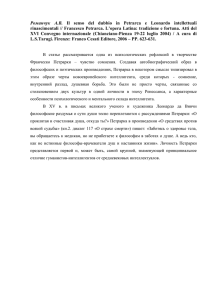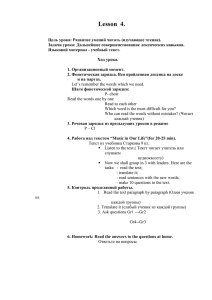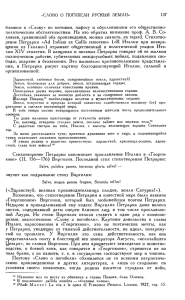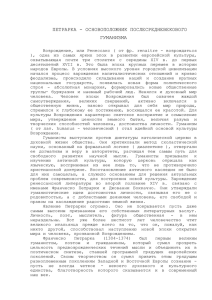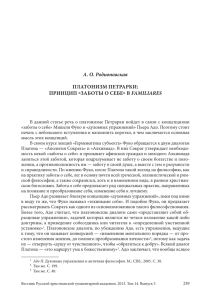МУЗЫКА И ПЕНИЕ КАК ТЕМА ДИАЛОГА ПЕТРАРКИ И
advertisement
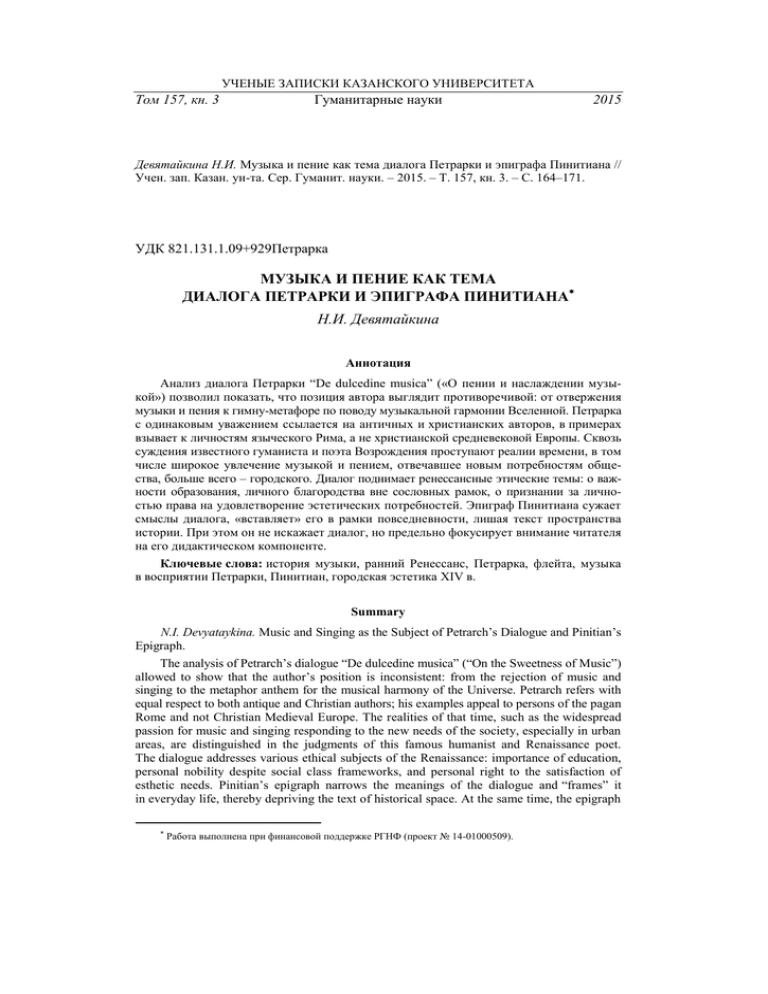
УЧЕНЫЕ ЗАПИСКИ КАЗАНСКОГО УНИВЕРСИТЕТА Том 157, кн. 3 Гуманитарные науки 2015 Девятайкина Н.И. Музыка и пение как тема диалога Петрарки и эпиграфа Пинитиана // Учен. зап. Казан. ун-та. Сер. Гуманит. науки. – 2015. – Т. 157, кн. 3. – С. 164–171. УДК 821.131.1.09+929Петрарка МУЗЫКА И ПЕНИЕ КАК ТЕМА ДИАЛОГА ПЕТРАРКИ И ЭПИГРАФА ПИНИТИАНА Н.И. Девятайкина Аннотация Анализ диалога Петрарки “De dulcedine musica” («О пении и наслаждении музыкой») позволил показать, что позиция автора выглядит противоречивой: от отвержения музыки и пения к гимну-метафоре по поводу музыкальной гармонии Вселенной. Петрарка с одинаковым уважением ссылается на античных и христианских авторов, в примерах взывает к личностям языческого Рима, а не христианской средневековой Европы. Сквозь суждения известного гуманиста и поэта Возрождения проступают реалии времени, в том числе широкое увлечение музыкой и пением, отвечавшее новым потребностям общества, больше всего – городского. Диалог поднимает ренессансные этические темы: о важности образования, личного благородства вне сословных рамок, о признании за личностью права на удовлетворение эстетических потребностей. Эпиграф Пинитиана сужает смыслы диалога, «вставляет» его в рамки повседневности, лишая текст пространства истории. При этом он не искажает диалог, но предельно фокусирует внимание читателя на его дидактическом компоненте. Ключевые слова: история музыки, ранний Ренессанс, Петрарка, флейта, музыка в восприятии Петрарки, Пинитиан, городская эстетика XIV в. Summary N.I. Devyataykina. Music and Singing as the Subject of Petrarch’s Dialogue and Pinitian’s Epigraph. The analysis of Petrarch’s dialogue “De dulcedine musica” (“On the Sweetness of Music”) allowed to show that the author’s position is inconsistent: from the rejection of music and singing to the metaphor anthem for the musical harmony of the Universe. Petrarch refers with equal respect to both antique and Christian authors; his examples appeal to persons of the pagan Rome and not Christian Medieval Europe. The realities of that time, such as the widespread passion for music and singing responding to the new needs of the society, especially in urban areas, are distinguished in the judgments of this famous humanist and Renaissance poet. The dialogue addresses various ethical subjects of the Renaissance: importance of education, personal nobility despite social class frameworks, and personal right to the satisfaction of esthetic needs. Pinitian’s epigraph narrows the meanings of the dialogue and “frames” it in everyday life, thereby depriving the text of historical space. At the same time, the epigraph Работа выполнена при финансовой поддержке РГНФ (проект № 14-01000509). does not distort or modify the dialogue. However, it maximally focuses the reader’s attention on its didactic component. Keywords: history of music, Early Renaissance, flute, music in Petrarch's perception, Pinitian, city esthetics of the 14th century. Источники I – Petrarca Fr. De remediis utriusque fortunae. – Bern, 1610. – 745 p. II – Petrarca Fr. De dulcedine musica // Petrarque Fr. Les remedes aux deux fortune. – Paris, 2002. – V. 1. – P. 120–124. Литература 1. 2. 3. 4. 5. 6. 7. 8. 9. 10. 11. 12. 13. 14. Fiske W. Petrarch’s treatise “De remediis utriusque fortunae”. – Firenze, 1888. – 96 p. Billanovich G. Petrarca e il primo Umanesimo. – Padova: Antenore, 1996. – XXXIV, 632 p. Ariani M. Petrarca // Storia della letteratura italiana. – Roma, 1995. – V. 2. – P. 632–643. Dotti U. Vita di Petrarca. –Torino, 2014. – 501 p. Špička J. Strategie dialogu v Petrarkově “De remediis”. – Brno, 2005. Špička J. La Speranza e le sue sirocchie nel “De remediis” di Petrarca // Verbum. – 2005. – No 7. – P. 221–234. Lentzen M. La fortuna del De remediis utriusque fortunae del Petrarca nei Paesi di lingua tedesca: Sebastian Brandt e il Petrarca // Francesco Petrarca: L’opera Latina: tradizione e fortuna: Atti del XVI Convegno internazionale (Chianchano–Pienza, 19–22 luglio 2004). – Firenze, 2006. – P. 361–372. Karlheinz S. Francesco Petrarca. Ein Intellektueller im Europa des 14. Jahrhunderts. – München-Wien, 2003. – 435 S. Андреев М.Л. Петрарка // Культура Возрождения. Энциклопедия. – М.: РОССПЭН, 2011. – Т. 2, кн. 1. – С. 535–539. Petrarque Fr. Les remedes aux deux fortune. – Paris, 2002. – V. 1. – 1165 p. Petrarque Fr. Les remedes aux deux fortune. – Paris, 2002. – V. 2. – 805 p. Gallico Cl. La musica a Milano nel Trecento // Petrarca e la Lombardia: Atti del Convegno di studi (22–23 maggio 2003). – Roma; Padova, 2005. – P. 65–76. Gallico Cl. Occorenze di Petrarca in musica // Quaderni petrarcheschi. – 2005/6. – V. 15/16. – P. 507–515. Worstbrock F.J. Pinicianus (Kening), Johannes // Deutscher Humanismus 1480–1520: Verfasserlexikon. – 2011. – Bd. 2. – S. 445–465. Поступила в редакцию 21.11.14 Девятайкина Нина Ивановна – доктор исторических наук, профессор кафедры менеджмента туристического бизнеса, Саратовский государственный технический университет им. Ю.А. Гагарина, г. Саратов, Россия. E-mail: devyatay@yandex.ru
